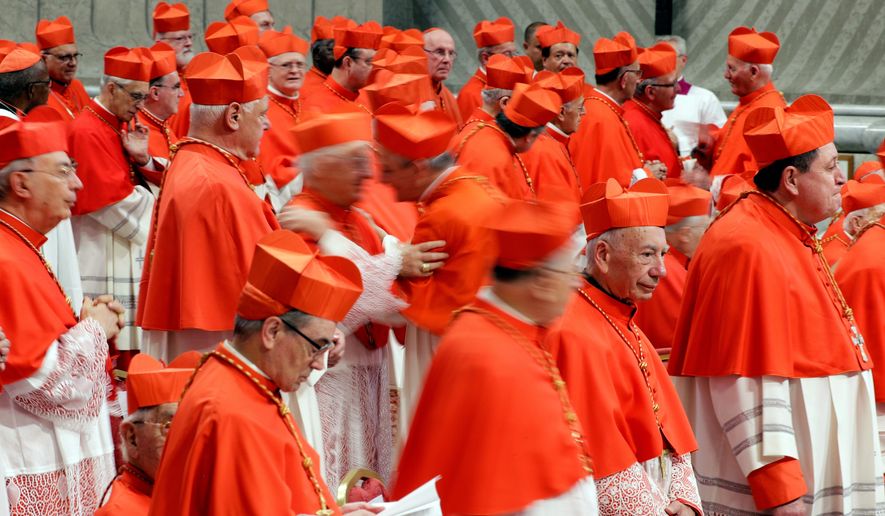Pope Francis created 13 new cardinals over the weekend, the latest sign of his solidifying his influence over his successor as head of the global Roman Catholic Church.
The appointments, which did not include any new American cardinals, comes as Pope Francis is engaged in an increasingly pointed clash with church conservatives over his stewardship of the church and the pope’s adherence to traditional Catholic doctrine and practices.
At the ceremony at St. Peter’s Basilica on Saturday, replete with red hat and gift of a signet ring, the Argentine-born pontiff ushered in an era of “compassion” in the worldwide faith, saying new prelates should ask if they are “compassionate toward this or that brother or sister.”
“So many disloyal actions on the part of ecclesiastics are born of the lack of a sense of having been shown compassion,” said the 82-year-old pope, in remarks first reported on by the Catholic News Service. “And by the habit of averting one’s gaze — the habit of indifference.”
This is Pope Francis’s sixth papal consistory, as the formal meeting of the College of Cardinals is known, and now 91 cardinals — or 52% of those who will be eligible to vote for the next pope — have been placed by the polarizing pope. Such appointments, akin to a president filling slots in a federal judiciary, give Francis “the power to reshape the Church in his image,” reported Religion News Service.
Of note, 10 of the 13 new cardinals are under 80, the age below which they could vote for a new pope.
Who wasn’t and was among those to receive a new ring and red hat (called a biretta) at the high altar says much about Pope Francis’ vision for reform within the church. While the College — the official clergy of Rome — is 42% European, the list of new cardinals included a Guatemalan bishop, an African missionary and the head of the Vatican’s Boyd on migrants.
Not among the new cardinals announced last month was 75-year-old Philadelphia Archbishop Charles Chaput, who was the first archbishop from the city in over a century not to be elevated to cardinal. Archbishop Chaput has been an ecclesiastical opponent of Pope Francis and had asked pastors not to give Communion to parishioners violating the church’s sexual teachings on marriage and gay relationships.
Francis did select Italian Archbishop Matteo Zuppi, who wrote an introduction to “Building a Bridge,” a 2017 book from U.S. Jesuit Rev. James Martin that called for the Church to embrace gay Catholics. Also named cardinal was Michael Czerny, undersecretary of the Section for Migrants and Refugees at the Dicastery for Promoting Integral Human Development, whose new pectoral cross was made from wood salvaged from a dinghy used by refugees traversing the Mediterranean Sea.
The College of Cardinals now includes 128 eligible electors. Forty-two electors were made cardinals by Pope Emeritus Benedict and 16 are remaining from the papacy of Pope John Paul II.
Among the new cardinals include Spanish Bishop Miguel Angel Ayuso Guixot, who said Pope Francis, in speaking to the new prelates, “made it understood that the church is a church on the move, a church open to all realities,” according to wire service reports.
Pope Francis has drawn wariness among the traditional and conservative wings of the Catholic Church, who view his pastoral approach and liberalizing efforts on issues such as divorce, the role of women in the church, migration, climate change and other social issues.
On Saturday, following the ceremony, Francis accompanied the new cardinals to the residence of Pope Emeritus Benedict, living at the Mater Ecclesiae Monastery within the Vatican compound. According to a Vatican spokesman, Benedict “reminded the new cardinals of the value of fidelity to the pope.”
The list of new cardinals also includes Ignatius Suharyo Hardjoatmodjo, archbishop of Jakarta; Havana Archbishop Juan Garcia Rodriguez; and Cristobal Lopez Romero, archbishop of Rabat, Morocco.
• Christopher Vondracek can be reached at cvondracek@washingtontimes.com.




Please read our comment policy before commenting.